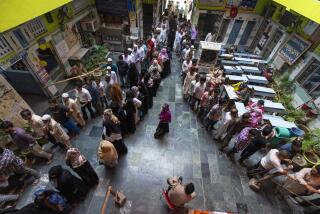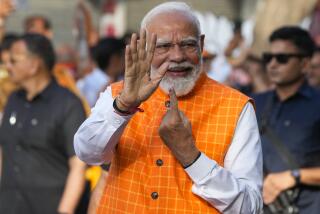40 Killed, More Than 200 Hurt by Bombs in India
- Share via
NEW DELHI — Muslim militants were suspected in a series of bombings Saturday that killed at least 40 people and wounded more than 200 in the southern Indian city of Coimbatore, on the eve of a national election that threatens to ignite India’s ancient communal tensions.
The thirteen bombs, which exploded in parked cars, restaurants and bakeries, were apparently timed to coincide with a visit by L. K. Advani, the president of the Bharatiya Janata Party, a Hindu nationalist group favored to win elections that begin Monday.
The BJP has risen to prominence on an avowedly anti-Muslim agenda that threatens to exacerbate tensions between the country’s two largest religious groups.
Advani, two hours late for a scheduled speech, was unharmed. One of the bombs exploded about 200 feet from where he was to speak.
“I have no words to describe my sense of horror, shock and grief at this ghastly incident,” Advani said afterward.
The bombings sparked clashes between Hindu and Muslim mobs, and police were ordered to shoot rioters in Coimbatore, Police Commissioner Nanjil Kumaran said.
The city is about 1,500 miles south of New Delhi.
No one immediately claimed responsibility for the blasts, but authorities suspected a Muslim group.
Early today, six people suspected of involvement in the blasts blew themselves up during a dawn raid by police, United News of India said.
The news agency said the six killed themselves as police swooped on a building in the heart of Coimbatore. Three police officers were injured, eight people were arrested, and police seized three bags of pipe bombs.
Press Trust of India said the six died trying to throw a bomb at police who were combing the area.
The blasts were the latest in a series of explosions that have jarred India in the days leading up to the election.
Some of the violence has been attributed to Muslim groups wary of the ascension of the BJP, which has advocated a series of measures likely to enrage India’s Muslims.
In December, a group called the Islamic Defense Force of Kerala claimed responsibility for three train bombings that killed 10 people in southern India. One of those bombs exploded in an area just outside Coimbatore.
In November, rioting between Hindus and Muslims in Coimbatore, an industrial city with a population of 2.5 million, left 14 people dead.
Preelection violence unrelated to the Hindu-Muslim conflict has broken out in other parts of the country.
Tribal guerrillas seeking independence in the northeastern state of Assam have killed three top political leaders in recent weeks and have warned residents against voting.
Last week, tribal violence in another northeastern state, Tripura, left 18 people dead.
The BJP, which many favor to win the elections, has ascended to prominence on a staunchly pro-Hindu--and anti-Muslim--platform.
Among the changes pushed by some members of the BJP are an abolition of the legal code that governs domestic relations among Muslims, a ban on the killing of cows, and the destruction of several Muslim mosques where Hindu temples once stood.
In 1992, Hindu extremists tore down a 16th century Muslim mosque at Ayodhaya, saying it had been constructed atop a holy Hindu temple that many Hindus believe was the birthplace of the god-king Ram.
The destruction of the mosque, known as Babri Masjid, sparked ferocious rioting that left more than 3,000 people dead across India.
Among those alleged to be present during the destruction of the mosque was Advani, the presumed target of Saturday’s bombings.
Many commentators say they fear a repeat of the Ayodhaya incident if the BJP comes to power.
Party leaders said recently that they are committed to building a Hindu temple on the site.
*
Tensions between Hindus and Muslims in India date back centuries.
One of the most violent manifestations occurred when the British pulled out of India in 1947 and split the old empire into India and Pakistan along Hindu-Muslim lines.
The violence that followed partition left about a million people dead and sparked one of history’s great migrations, forcing 10 million Hindus and Muslims to flee their homes.
As the BJP has come closer to gaining power, its leaders have softened their anti-Muslim rhetoric.
On Saturday, Advani cautioned Indians against allowing the bombings to inflame communal tensions. And he urged rescue workers not to discriminate on the basis of religion.
“I appeal to Hindus and Muslims alike to maintain peace and reject all provocation,” he said.
But Muslims--and many Hindus--say they are deeply troubled by the prospect of the BJP coming to power.
Sonia Gandhi, the widow and daughter-in-law of two late Indian prime ministers, has toured the country to denounce the BJP’s pro-Hindu agenda. In the past several weeks, the BJP has begun to drop significantly in preelection polls.
Wherever Gandhi makes an appearance to speak, she is greeted by thousands of Indian Muslims who say they fear a BJP government.
More to Read
Sign up for Essential California
The most important California stories and recommendations in your inbox every morning.
You may occasionally receive promotional content from the Los Angeles Times.












